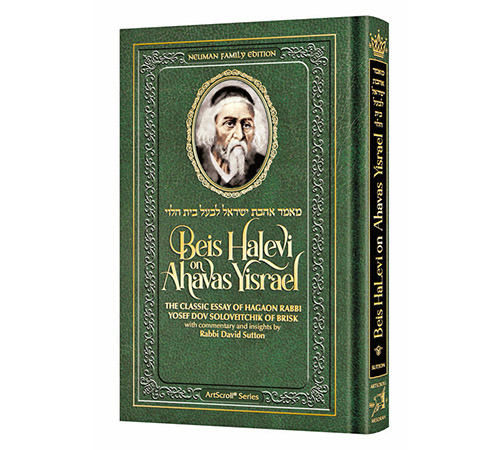
Highlighting: “Beis HaLevi on Ahavas Yisrael: The Classic Essay of HaGaon Rabbi Yosef Dov Soloveitchik of Brisk,” by Rabbi David Sutton. Mesorah Publications Ltd. 2023. English. Hardcover. 249 pages. ISBN-13: 978-1422633014.
(Courtesy of Artscroll) We are living in a world that surrounds us with conflict, distrust and outright hatred of all sorts. In contrast, baruch Hashem, the chesed that abounds in Torah communities is unparalleled anywhere. The first chapter of Pirkei Avos begins with the statement that one of the pillars of the world is gemilus chassadim, kind deeds, and the chapters end by saying that shalom, peace, is one of the foundations of the world.
Ahavas Yisrael, love of our fellow Jews, is at the essence of these foundations of our world, and the Beis HaLevi, HaGaon HaRav Yosef Dov Soloveitchik of Brisk, wrote a basic treatise on this subject. And this is an especially important subject in today’s tumultuous world, both here and in Eretz Yisrael.
ArtScroll/Mesorah’s new “Beis HaLevi on Ahavas Yisrael” is very timely. Rabbi David Sutton, of the Yad Yosef Torah Center, has poured his wealth of knowledge and wisdom into his commentary and insights on the Beis HaLevi’s classic. His work sheds light on the Beis HaLevi’s essay and shows how the great Lithuanian gadol’s words apply equally to today’s modern society.
Rabbi Sutton is a unique personality in his own right, as demonstrated in his “Living Shabbos,” “Bais HaLevi on Bitachon” and “A Daily Dose of Bitachon,” all published by ArtScroll/Mesorah.
In his brilliant essay on ahavas Yisrael, the Beis HaLevi beautifully explains the mitzvah of loving your fellow Jew. Who does the mitzvah apply to? When does it apply? What do I need to do to fulfill it properly? The Beis HaLevi also provides incentives to help us do the mitzvah in the best possible way.
ArtScroll/Mesorah’s “Beis Halevi on Ahavas Yisrael” contains wonderful insights, uplifting stories, and in-depth appendices, as well as a special section of touching anecdotes about gedolim from a range of generations and communities.
The following is a brief excerpt from the new book.
A Time for Ahavas Yisrael
In the days between Pesach and Shavuos, we mourn the passing of R’ Akiva’s 24,000 students who perished during this time. As we know, the Gemara (Yevamos 62b) teaches that they died as a punishment for the lack of respect that they had for one another. It is important to note that when the Gemara describes a lack of respect, it is not meant as we use the term today. Even what we call respect doesn’t come close to the way Rabbi Akiva’s students acted toward one another. Rather, on their great level, they were held accountable for even the most infinitesimal manifestation of disrespect.
Rav Elazar Menachem Man Shach told the following story to illustrate what respect truly means: The two great Torah giants of their generation, Rav Akiva Eiger and Rav Yaakov Loberbaum of Lissa, known as the Nesivos HaMishpat, were guests together in another town. In shul, the gabbai called up Rav Akiva Eiger to receive an aliyah. When he heard his name, he fainted. Why did he faint? Because he felt that it was a lack of respect to Rav Yaakov that the gabbai chose him to receive the aliyah rather than giving it to Rav Yaakov. In an effort to revive Rav Akiva Eiger, Rav Yaakov whispered in his ear, “The reason you were given the aliyah is not because they felt that you were greater than I am, but because you are the rav of a city with more inhabitants.”
With that, Rav Akiva Eiger was revived. This is how gedolei Yisrael respect one another!
Of course, during the Sefirah period, we properly adhere to the laws of mourning and refrain from haircuts and shaving, weddings and music, and the like. But we often forget why we are doing so. Indeed, Kaf HaChaim (493:5) writes, “All that we do is in order to remind ourselves to stay away from hatred, jealousy, desire, arrogance, and honor. And to acquire the traits of love, humility, and peace.”
The main point is to actually remember what caused the students of Rabbi Akiva to perish— their lack of respect toward one another—and try to rectify their sin.
Similarly, Rav Chaim Palagi (Moed L’Kol Chai 6:11) writes, “The love of friends, at all times, should be an internal love of the heart and soul, and not merely external. How much more careful must one be during the time between Pesach and Shavuos that there should be an increase of obvious love and endearment.”













